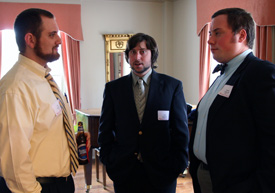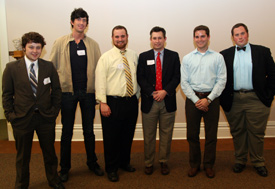The Bachelor only turns 100 once. In that light, it is only proper for those involved with the storied publication, both past and present, to gather to talk about not only past experiences but ideas for the future of the publication.
Tuesday afternoon and evening The Bachelor staff and advisors as well as the greater Wabash community welcomed former Bachelor staffers to campus. Chris Cotterill ’99, Adam Christensen’03, Jacob Pactor ’04, and Ryan Smith ’03 came back to share their wit, wisdom, and ideas for the future of the student newspaper over dinner and a panel discussion.
 Although each of them served as editorial leaders on the "Student Voice of Wabash" during their time with the College and three (Cotterill, Pactor and Christensen) served as editors, each man is pursing a very different career.
Although each of them served as editorial leaders on the "Student Voice of Wabash" during their time with the College and three (Cotterill, Pactor and Christensen) served as editors, each man is pursing a very different career.
Cotterill, who served as editor-in-chief his sophomore, junior, and senior years, was recently named the corporation counsel for the city of Indianapolis under the new Greg Ballard administration, making him the city’s leading attorney. As a freshman when the Wabash Theater Department put on the first act of Tony Kushner’s Angels in America Cotterill understood the role the Bachelor needed to take in facilitating the discussion of the controversial play.
"I remember as a freshman specifically thinking that faculty and staff were making a far larger issue out of it than the students were," he said. "But as I learned more about it and as I began to mature, I began to understand the challenges of Angels at an all-male campus. We were the first college campus to produce this, so there was a lot of national attention.
 "What we did do with respect to Angels is to try and get the opinions from multiple angles and to not be a filter to that. At a time when something called the Commentary was speaking with a bullhorn and doing so for many quite effectively compared to the Bachelor we were getting more ground and more of a foundation to speak from the middle and allow more people to use us as a forum."
"What we did do with respect to Angels is to try and get the opinions from multiple angles and to not be a filter to that. At a time when something called the Commentary was speaking with a bullhorn and doing so for many quite effectively compared to the Bachelor we were getting more ground and more of a foundation to speak from the middle and allow more people to use us as a forum."
Christensen was the only man in the paper’s history to be named Indiana Collegiate Press Association Journalist of the Year, primarily for a series of stories he developed about gay men at Wabash. He noted that planning for such a long term story was integral for it to be done well.
"We really wanted to do something that was important — a hard-hitting big investigative piece," he said. "We came down to a couple of different ideas. One of the ideas, though it seems like a cliche at time, was homosexuality on campus. 'shOUT had done a lot of things and had been working very hard since the Angels time. By the time I was on campus, 'shOUT was growing again. It had a good voice and good people and it was active. That got us to thinking what was it like to be gay on campus right now – not in 1992, not in 1999 right now."
The series, titled "Gay Today at Wabash" incorporated many different perspectives and aspects of homosexuality on campus. To understand how Wabash affects gays after they leave Wabash, Christensen elicited the help of those that knew post-Wabash life the best.
 "We started working on a bunch of different stories and a bunch of different perspectives," he said. "We decided we wanted to give the opportunity for the alumni to speak — not necessarily to publish their entire stories but to tell us what it was like, how their lives were now, and how they had changed while they were here (at Wabash), in Crawfordsville, in Indiana, and all the different layers that go with that."
"We started working on a bunch of different stories and a bunch of different perspectives," he said. "We decided we wanted to give the opportunity for the alumni to speak — not necessarily to publish their entire stories but to tell us what it was like, how their lives were now, and how they had changed while they were here (at Wabash), in Crawfordsville, in Indiana, and all the different layers that go with that."
All four alums provided staffers and those connected with the paper their insight on what worked and what did not work — none more voraciously than three-year editor Jacob Pactor. Pactor, who teaches at North Central High School and is pursuing a master's degree in English at Butler University, noted that although it may sound like a good idea to always go for the glitzy story, doing so without relationships with key individuals will not allow for a well done piece.
"The little things you do make a big difference," he said. "The nuts and bolts of getting the story out are important. If you don’t build those relationships, you won’t get those stories. One of the best things Jim (Amidon ‘87) did for me was when I was editor was to encourage me to set up regular meetings with people on campus like the president, dean of students, and other administrators –—so I could have the access to those on campus who knew what was going on. If you don’t have those relationships built, you can’t go ask them the harder questions later."
 Pactor also noted the incredible level of readership the Bachelor has with students, alumni and the greater Wabash community. This job includes not only informing Wabash about events, but also prospective students interested in the stories of the College.
Pactor also noted the incredible level of readership the Bachelor has with students, alumni and the greater Wabash community. This job includes not only informing Wabash about events, but also prospective students interested in the stories of the College.
"The Bachelor is the only publication that reaches every person affiliated with Wabash College," he said. "You have a great opportunity to write about whatever you want. You also have a great responsibility to be the student voice of Wabash College. When I talk to students about where they should go to college I would advise them to look at the College’s website and pick up the student newspaper. If one of those didn’t sit right with you, don’t go there."
Out of the each of the four members on the panel, only Ryan Smith pursued a career in journalism. After graduating Wabash with honors, Smith went on to the Columbia University Graduate School of Journalism and is now an assistant producer with the CBS news magazine 48 Hours. Many of the stories Smith works on could take up to two years to develop, and countless numbers never actually make it to air. Smith juggles anywhere between 30 and 50 of these stories at a time. Because of the nature of the stories that Smith works with, getting people to talk about what is happened can be at times challenging.
 "I’ve learned that building relationships, respecting them, and actively listening to them (are important), he said. "I’ve had experiences in my life that may lend me to feel one way or another about a particular situation. What I’ve learned is that it’s not my business or job to make decisions about what is happening. My business is to show them that I am eagerly listening to them, allowing them to talk and not (to) badger them with questions. When you do that, they’ll start talking to you and trusting you."
"I’ve learned that building relationships, respecting them, and actively listening to them (are important), he said. "I’ve had experiences in my life that may lend me to feel one way or another about a particular situation. What I’ve learned is that it’s not my business or job to make decisions about what is happening. My business is to show them that I am eagerly listening to them, allowing them to talk and not (to) badger them with questions. When you do that, they’ll start talking to you and trusting you."
Smith noted that many of the journalistic skills he still uses in his capacity with 48 Hours were grounded in his work on staff for the Bachelor.
"The Bachelor gave me an opportunity just to try it," he said. "It was really about learning and giving me a chance to refine the craft of journalism. There’s a certain base that we (as journalists) all need to know, and I think you’re learning those skills right now. I think that if you progress (in journalism), you’ll be making use of those skills everyday."
Many of those who listened to the talk were impressed with what the panelists had to say and how the Bachelor positively affected their careers.
"It was good to see how their experience with the Bachelor had positioned people for success later in life," said Bachelor Columnist Kyle Cassidy ’08, "and better still to have them return and share their experience with the current staff."
The Bachelor celebrates its 100th Anniversary on April 9th and will publish a special 100th Anniversary issue today and its usual weekly issue Thursday.
In Photos: Top left, Ryan Smith '03 talks with Bachelor staffers about the reporting he does for CBS News' 48 Hours program. To right, moderator and Bachelor Advisor Howard Hewitt listens to Cotterill and Pactor. Center left, Pactor holds court with Bachelor managing Editor Aaron Parrish '08 and Editor Patrick Smith '08. Center right, President Patrick White enjoys a moment after dinner with Bachelor reporter Gary James '10. Bottom left, Bachelor Editors: Patrick McAlister '10, editor-elect, Ryan Smith '03, Managing Editor, and Editors Jacob Pactor '03, Chris Cotterill '99, Adam Christensen '03, and Patrick Smith '08.